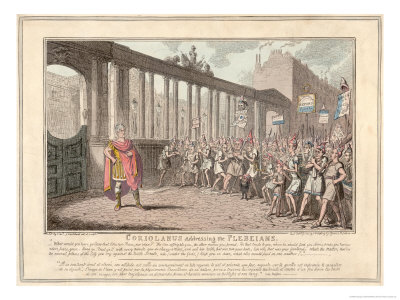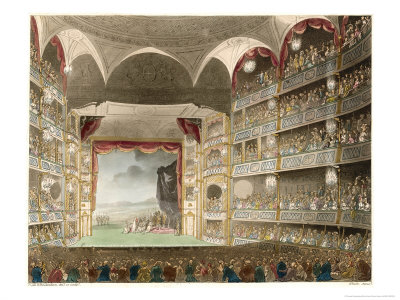Week 1: Macbeth with a textual analysis
Week 2: Coriolanus with a performance analysis
Week 3: A Midsummer Night's Dream...no analysis
I figured because I will actually be using A Midsummer Night's Dream in my paper I should go back and post a textual analysis for my play.
This play has multiple storylines. Here is a general summary of the storyline I will be focusing on in my analysis:
In A Midsummer Night’s Dream the fairy king- Oberon- interferes with a mortal love triangle. There are two women and two men, but the two men--Demetrius and Lysander--are in love with the same woman--Hermia--while each woman loves one of the men. (The girls got it right, why are the men so difficult?) Oberon observes this dilemma by hearing Helena chase Demetrius who does not love her. He resolves to help her and cast a potion on Demetruis’s eyes, because indeed women, “should be wood, and were not made to woo” (2, 1, 256-7). So begins the meddling of Oberon and his fairy Puck; they force change upon the mortal lovers. At first, the change is a disaster because Puck confuses the men and we end up with both Lysander and Demetrius chasing Helenia--whom they both before scorned--instead of Hermia. Eventually, everything is set straight and they are matched to resolve all conflict-- Hermia with Lysander, and Demetruis with Helenia.
Here are some excerpts that present relationships I will use in relation to my paper:
Hermia is completely subject to her father's will as students are subject to their teachers--
Shakespeare loves rebellious youth. In A Midsummer Night’s Dream Hermia is subjected to her father’s will and is bound by law to marry whom he chooses. Egeus invokes law and reason when he begs, “the ancient privilege of Athens,” stating that his daughter is his possession and, “[he] may dispose of her” (1,1,42-43). The law supports this ideology and Theseus, the duke of Athens, informs Hermia that she must “either prepare to die for disobedience to your father’s will or else to wed Demetrius” (1,1,86-88). Sometimes teachers and students portray a similar relationship. The teacher is unwilling to change their methods and listen to what the student’s wants. This creates a tense relationship between teacher and student because student opinion is not valued and they don’t feel invested in their own learning. We need to get rid of the idea that there is only one way to teach students. Every student learns differently and through implementing technology correctly teachers can bolster and support individual student learning. It is not healthy for students and teachers to develop a relationship similar to that of Hermia and her father. The law forces Hermia to regard her father, “as a god” and she is just, “a form in wax...within his power to leave the figure or disfigure it” (1,1,47-51). Students will be more motivated and willing to learn if they are allowed involvement and choices in the classroom. Learning should be a collaborative activity. (I will add additional source quotes to support this idea)Egeus is subject to Thesus's decisions and authority as teachers are subject to their administration--
Sometimes there are obstacles in incorporating technology into the classroom. Often schools do not allow access to social media- like facebook or twitter- or they do not have enough computers to make technological integration during class realistic. In A Midsummer Night’s Dream after the young couples come out of the woods Demetrius no longer wants to marry Hermia because his affections have turned towards Helenia. Thesus, the duke, and Egeus, Hermia’s father, are both present to hear this declaration. Thesus then asserts his authority and says, “Egeus, I will overbear your will” and the couples are to get married that day to whom they wish (4,1,179). Egeus recognizes Thesus’s authority over him and says nothing in protest. Sometimes teachers must accept opposition and recognize the current realities of their students situations and the administrative authority. *quote on barriers that you cannot change* Hopefully these obstacles will be overcome through future persuasion and circumstances, but teachers cannot overlook current realities.**I will definitely rearrange this paragraph structure to fit the flow of my paper. I don't like the flow of it right now, but the ideas and beginning integration is there. That is what I wanted to show--the beginnings.








